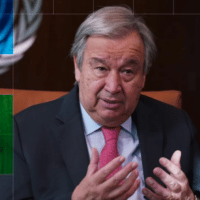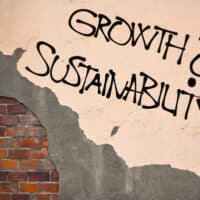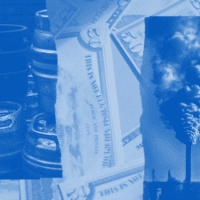-
Limits to growth: Inconvenient truth of our times
Ahead of the first United Nations environmental summit in Stockholm in 1972, a group of scientists prepared The Limits to Growth report for the Club of Rome. It showed planet Earth’s finite natural resources cannot support ever-growing human consumption.
-
UN chief warns ‘we will be doomed’ without historic climate pact
António Guterres claims that the difference between the rich world and less developed nations is the main obstacle to discuss in the COP27 discussions.
-
The apocalypse in popular culture
From plagues and zombies to nukes, asteroids and tidal waves, Siobhan McGuirk and Marzena Zukowska assess how apocalyptic fiction reflects and shapes the anxieties of our age.
-
The real impediments to mitigating global racism
In the words of Nada Al-Nashif, Acting UN High Commissioner for Human Rights, the actual barometer for success must be positive change in the lived experiences of people. This is why the reluctance of nations still in denial over racial injustice at home to earnestly reckon with the legacies of slavery and colonialism deserves to be called out in full.
-
Developing countries need monetary financing
Developing countries have long been told to avoid borrowing from central banks (CBs) to finance government spending. Many have even legislated against CB financing of fiscal expenditure.
-
UN votes 152 to 5 telling Israel to get rid of its nuclear weapons
The United Nations General Assembly voted overwhelmingly, 152 to 5, to tell the Israeli apartheid regime to get rid of its nuclear weapons, which are illegal under international law.
-
Herman Daly: An economist for eco-social activists
A new book explains how an economist, in challenging the orthodoxy, has helped activists change the world.
-
As Ukraine war escalates, the climate movement goes AWOL
Lascaris: This is no time to prioritize political expediency and serenity over the reputational perils of anti-war activism.
-
We need a new Trade Union of the poor rooted in the Global South: The Forty-Third Newsletter (2022)
Chaos reigns in the United Kingdom, where the prime minister’s residence in London–10 Downing Street–prepares for the entry of Rishi Sunak, one of the richest men in the country.
-
Mike Davis on becoming a Marxist
After losing a coveted niche in the trucking industry, I started UCLA as an adult freshman, attracted by rumors of a high-powered seminar on Capital led by Bob Brenner in the History Department.
-
Dossier No. 57: The geopolitics of inequality: Discussing pathways towards a more just world
This dossier is about inequality, or inequalities, between the North and South, between the rich and poor, and between the classes that labour and those that profit.
-
Capitalism in the Anthropocene: Ecological Ruin or Ecological Revolution
The United Nations international panel on climate change, the IPPC, predicts that as a result of the increase in greenhouse gases by the year 2050 there will be 1 billion climate refugees. Temperatures must be held within a 1.5 Celsius increase. If it goes up, as predicted, an increase of 4 degrees would end civilization.
-
Disruptive action on the climate deserves our support
We can learn from past movements and we can and should study the results of the many tactics activists are employing.
-
Cheng Enfu: The new pattern of international economy and politics is conducive to the development of world socialism
In September 2021, I spoke at the launch meeting of the Manifesto: Through Pluripolarity to Socialism. The Manifesto has a clear theme, profound ideas, magnificent momentum, and clearly articulated the history of world socialism, its present status quo and future.
-
Cashing in on carbon capture: How Big Oil will spend our money
Big Oil stands to pocket billions in taxpayer dollars by way of carbon capture, their latest climate scam. Here’s how they’ll do it.
-
Stop worshiping central banks
Preoccupied with enhancing their own ‘credibility’ and reputations, central banks (CBs) are again driving the world economy into recession, financial turmoil and debt crises.
-
“Marx and the Robots. Networked Production, AI and Human Labour” – book review
A new collection of essays provides important sceptical discussions of the impact of robotics and AI on the economy, finds Elaine Graham-Leigh
-
Inside the global garment industry
Clothing and footwear manufacturing is characterised by a globalised “value chain”, in which each phase of production is concentrated in a different region.
-
Vehicles of Extraction
After years of false starts, the electric vehicle (EV) finally seems to be picking up steam. Last year, the Biden administration announced ambitious targets to increase the adoption of EVs, along with funding for a number of measures aimed at making them more attractive to Americans. By 2030, the president wants half of all new vehicle sales to be electric. To encourage that, the government is providing financial incentives for drivers to buy them, installing new charging stations across the country, helping build the supply chain, and extending support to retool the factories that are manufacturing these supposed cars of the future.1 It’s a comprehensive plan for a large-scale effort, and industry seems to be on board.
-
The OPEC’s decision to cut oil output
WHAT is called OPEC+, that is the 13 members of the Organisation of Petroleum Exporting Countries (OPEC) together with 11 other petroleum exporting countries led by Russia, decided on October 5 to cut their oil production by 2 million barrels per day, starting from November. The U.S. had been pressing OPEC not to take this decision.




















